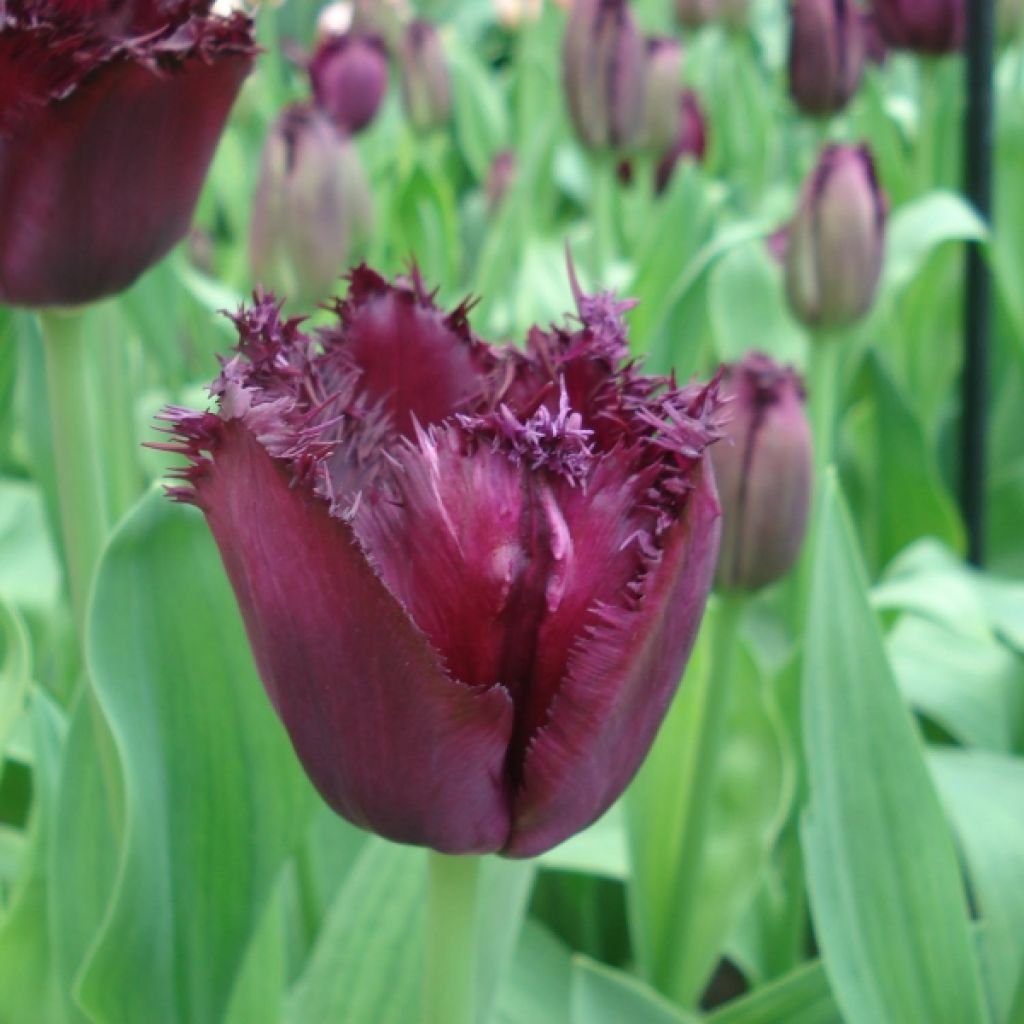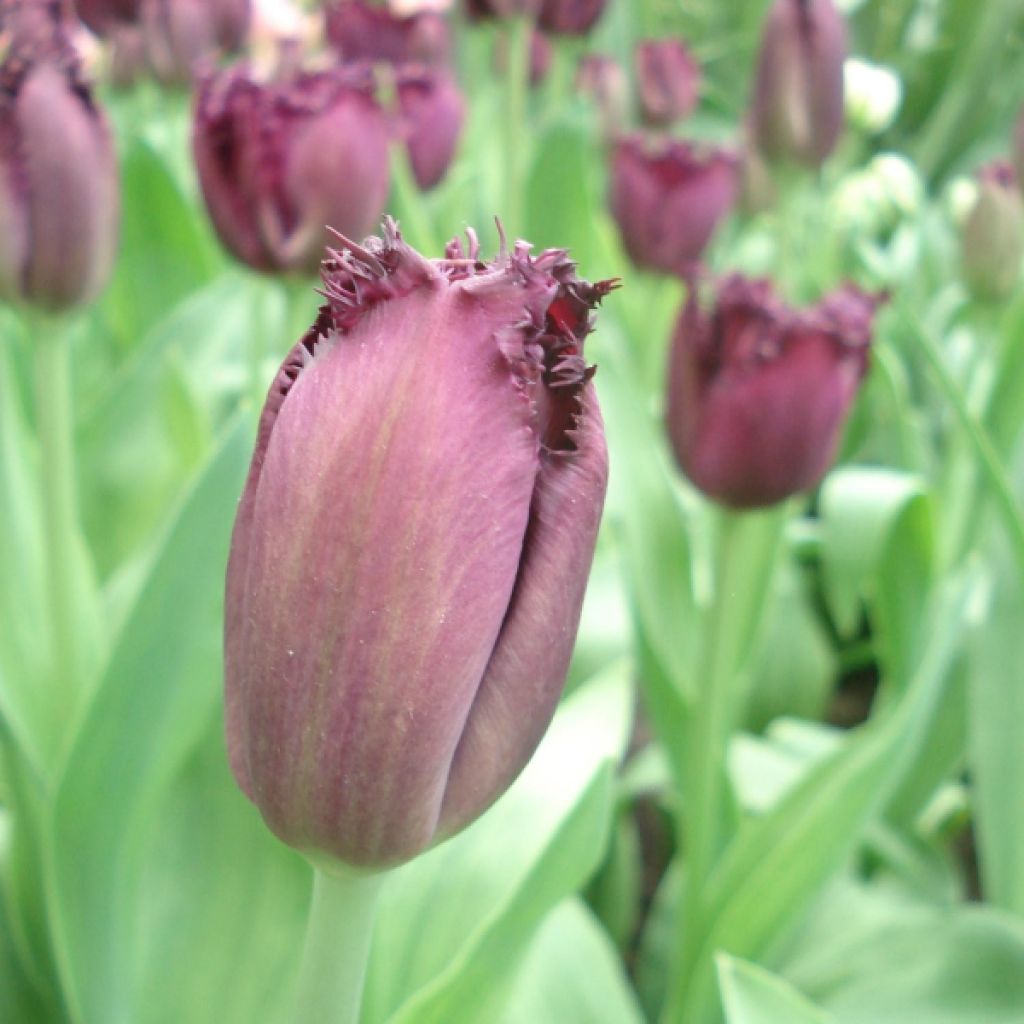

Tulipa crispa Cuban Night - Fringed Tulip


Tulipa crispa Cuban Night - Fringed Tulip
Tulipa crispa Cuban Night - Fringed Tulip
Tulipa crispa Cuban Night
Crisped Tulip, Fringed Tulip, Curled Tulip
For now, I haven't seen the flowering yet, hoping that it's the right colours. Otherwise, perfect delivery.
Beatrix A., 01/10/2018
This plant carries a 6 months recovery warranty
More information
We guarantee the quality of our plants for a full growing cycle, and will replace at our expense any plant that fails to recover under normal climatic and planting conditions.
From €5.90 for pickup delivery and €6.90 for home delivery
Express home delivery from €8.90.
Does this plant fit my garden?
Set up your Plantfit profile →
Description
Tulipa 'Cuban Night' is one of the darkest fringed edge tulip varieties. Its large, satin flowers display an intense violet-purple colour, which appears black in certain lights. Their fringed petals are slightly curved outward, giving them their unusual shape. It blooms in May. The flowers appear at the top of tall stems, which are ideal for bouquets.
Tulipa 'Cuban Night' belongs to the Liliaceae family. Horticulturally bred and introduced in 2007, it is classified in the 'Crispa' group, whose main characteristic is the finely toothed tips of the petals. This tall tulip has a sturdy 55cm (22in) stem that withstands inclement weather. Flowering takes place in May, at the end of the tulip season. The flowers are single, with a slightly open cup shape when they bloom, opening to reveal shiny petals in a rich violet-purple colour. The colour is lighter in the sun, almost black in the shade. The fringed edges of the petals give the illusion that the flower is sprinkled with sugar, or covered in frost in the middle of May. The flowers last a long time, extending the tulip season.
There are few plants to rival dentate tulips. They are unique and elegant, and are resistant to heat and inclement weather. 'Cuban Night' is ideal with white varieties ('Snow Crystal'), bright pink ('Mascotte'), or soft ('Santander'). It can create beautiful dark spots in perennial beds, accompanied by biennial plants that fill the space after flowering. You can choose wallflowers, forget-me-nots, or dame's rocket for this purpose. Marbled foliage heucheras, like the 'Snow Angel' cultivar, and pink ones like 'Berry Smoothie' highlight the dark colours, as well as white perennial geraniums ('Laura') or blue ones ('Rozanne', 'Johnson Blue', 'Orion'). It can be placed in borders, rockeries, flower beds, pots, and containers. This tulip beautifully enhances balconies and patios. It goes perfectly with pansies or primroses. Dentate tulips bring a unique touch to bouquets.
Report an error about the product description
Plant habit
Flowering
Foliage
Botanical data
Tulipa
crispa
Cuban Night
Liliaceae
Crisped Tulip, Fringed Tulip, Curled Tulip
Cultivar or hybrid
Planting and care
Plant the bulbs as soon as possible in well-drained soil. Loosen the soil thoroughly. Plant at a depth of 15cm (6in) (the bulbs should be covered with twice their height of soil). Space the bulbs a few cm apart, making sure they do not touch. Choose a sunny location for optimal flowering. After flowering, cut the flower stems and allow the leaves to completely dry before cutting them.
Planting period
Intended location
Care
-
, onOrder confirmed
Reply from on Promesse de fleurs
Haven't found what you were looking for?
Hardiness is the lowest winter temperature a plant can endure without suffering serious damage or even dying. However, hardiness is affected by location (a sheltered area, such as a patio), protection (winter cover) and soil type (hardiness is improved by well-drained soil).

Photo Sharing Terms & Conditions
In order to encourage gardeners to interact and share their experiences, Promesse de fleurs offers various media enabling content to be uploaded onto its Site - in particular via the ‘Photo sharing’ module.
The User agrees to refrain from:
- Posting any content that is illegal, prejudicial, insulting, racist, inciteful to hatred, revisionist, contrary to public decency, that infringes on privacy or on the privacy rights of third parties, in particular the publicity rights of persons and goods, intellectual property rights, or the right to privacy.
- Submitting content on behalf of a third party;
- Impersonate the identity of a third party and/or publish any personal information about a third party;
In general, the User undertakes to refrain from any unethical behaviour.
All Content (in particular text, comments, files, images, photos, videos, creative works, etc.), which may be subject to property or intellectual property rights, image or other private rights, shall remain the property of the User, subject to the limited rights granted by the terms of the licence granted by Promesse de fleurs as stated below. Users are at liberty to publish or not to publish such Content on the Site, notably via the ‘Photo Sharing’ facility, and accept that this Content shall be made public and freely accessible, notably on the Internet.
Users further acknowledge, undertake to have ,and guarantee that they hold all necessary rights and permissions to publish such material on the Site, in particular with regard to the legislation in force pertaining to any privacy, property, intellectual property, image, or contractual rights, or rights of any other nature. By publishing such Content on the Site, Users acknowledge accepting full liability as publishers of the Content within the meaning of the law, and grant Promesse de fleurs, free of charge, an inclusive, worldwide licence for the said Content for the entire duration of its publication, including all reproduction, representation, up/downloading, displaying, performing, transmission, and storage rights.
Users also grant permission for their name to be linked to the Content and accept that this link may not always be made available.
By engaging in posting material, Users consent to their Content becoming automatically accessible on the Internet, in particular on other sites and/or blogs and/or web pages of the Promesse de fleurs site, including in particular social pages and the Promesse de fleurs catalogue.
Users may secure the removal of entrusted content free of charge by issuing a simple request via our contact form.
The flowering period indicated on our website applies to countries and regions located in USDA zone 8 (France, the United Kingdom, Ireland, the Netherlands, etc.)
It will vary according to where you live:
- In zones 9 to 10 (Italy, Spain, Greece, etc.), flowering will occur about 2 to 4 weeks earlier.
- In zones 6 to 7 (Germany, Poland, Slovenia, and lower mountainous regions), flowering will be delayed by 2 to 3 weeks.
- In zone 5 (Central Europe, Scandinavia), blooming will be delayed by 3 to 5 weeks.
In temperate climates, pruning of spring-flowering shrubs (forsythia, spireas, etc.) should be done just after flowering.
Pruning of summer-flowering shrubs (Indian Lilac, Perovskia, etc.) can be done in winter or spring.
In cold regions as well as with frost-sensitive plants, avoid pruning too early when severe frosts may still occur.
The planting period indicated on our website applies to countries and regions located in USDA zone 8 (France, United Kingdom, Ireland, Netherlands).
It will vary according to where you live:
- In Mediterranean zones (Marseille, Madrid, Milan, etc.), autumn and winter are the best planting periods.
- In continental zones (Strasbourg, Munich, Vienna, etc.), delay planting by 2 to 3 weeks in spring and bring it forward by 2 to 4 weeks in autumn.
- In mountainous regions (the Alps, Pyrenees, Carpathians, etc.), it is best to plant in late spring (May-June) or late summer (August-September).
The harvesting period indicated on our website applies to countries and regions in USDA zone 8 (France, England, Ireland, the Netherlands).
In colder areas (Scandinavia, Poland, Austria...) fruit and vegetable harvests are likely to be delayed by 3-4 weeks.
In warmer areas (Italy, Spain, Greece, etc.), harvesting will probably take place earlier, depending on weather conditions.
The sowing periods indicated on our website apply to countries and regions within USDA Zone 8 (France, UK, Ireland, Netherlands).
In colder areas (Scandinavia, Poland, Austria...), delay any outdoor sowing by 3-4 weeks, or sow under glass.
In warmer climes (Italy, Spain, Greece, etc.), bring outdoor sowing forward by a few weeks.


































